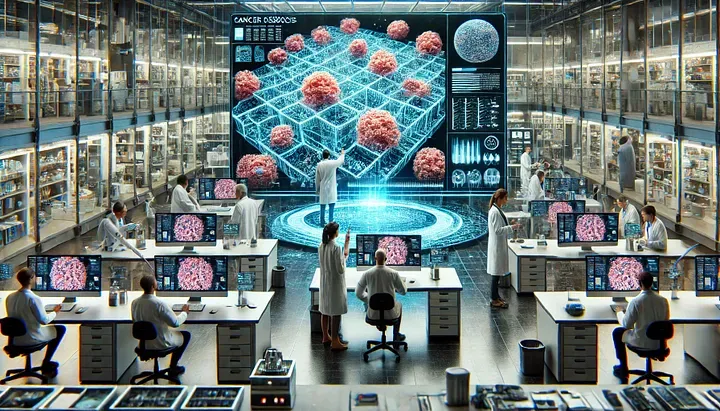AI’s New Frontier in Cancer Diagnosis

Researchers at Harvard Medical School have developed an innovative artificial intelligence tool, CHIEF (Cellular Hierarchical Inference Engine Framework), which promises to revolutionize cancer diagnostics and prognosis. This cutting-edge AI tool is designed to analyze the intricate cellular architecture within tumor tissues, enhancing the precision of cancer diagnosis and offering a more accurate prediction of patient outcomes. By leveraging advanced algorithms and machine learning, CHIEF aims to support clinicians in creating personalized treatment plans, potentially improving patient care and survival rates.
The complexity of cancer diagnosis lies in the heterogeneity of tumor cells, which can vary significantly even within a single tumor mass. Traditional diagnostic methods rely heavily on histopathological analysis, where pathologists examine tissue samples under a microscope to identify cancerous cells. (This is a fancy way of describing how doctors look at cells, how they are arranged, and if they look different from healthy cells.) However, this approach has limitations; it is labor-intensive, subjective, and prone to various interpretations between observers. CHIEF addresses these challenges by utilizing machine learning algorithms to analyze vast amounts of cellular data objectively.
By examining the spatial arrangement and architectural patterns of cells within tumor tissues, CHIEF can identify subtle differences that may not be immediately apparent to the human eye. This capability enables the tool to detect cancer earlier, identify aggressive forms of the disease, and predict how a patient might respond to different treatments. The tool’s ability to learn from large datasets allows it to continually refine its diagnostic criteria, improving its accuracy over time.
One of CHIEF’s most significant benefits is its potential to improve patient outcomes by aiding in the development of more precise treatment plans. Providing a more detailed analysis of the tumor’s cellular design can help oncologists determine the most effective treatment strategy for each patient, whether it involves surgery, chemotherapy, radiation therapy, or targeted therapies. This personalized approach to cancer treatment could significantly increase the chances of successful outcomes, reduce unnecessary side effects, and enhance patients’ overall quality of life.
CHIEF’s predictive capabilities extend beyond initial diagnosis. The tool can predict the likelihood of recurrence (metastasis) by analyzing how a tumor’s cellular structure changes over time. This foresight enables clinicians to implement preventative measures or adjust treatment protocols proactively, potentially reducing the risk of cancer progression.
While CHIEF represents a significant advancement in the field of oncology, it is not without challenges. Integrating AI tools in clinical practice requires careful consideration of ethical, regulatory, and logistical factors. For instance, the tool’s reliance on extensive data raises patient privacy and security concerns. Healthcare providers must be trained to interpret and utilize AI-generated insights effectively.
Future research will likely focus on expanding capabilities to include a broader range of cancer types and refining its algorithms to enhance diagnostic accuracy further. Collaboration between data scientists, oncologists, and regulatory bodies will ensure that this and similar AI tools are developed and implemented to maximize patient benefits while minimizing potential risks.
The development of CHIEF by researchers at Harvard Medical School marks a significant milestone in the evolution of cancer diagnostics. Harnessing the power of artificial intelligence to analyze cellular architecture in tumor tissues offers a promising new tool for early cancer detection, accurate prognosis, and personalized treatment planning. As the tool continues to evolve, it holds the potential to improve patient outcomes dramatically, providing hope for millions affected by this complex disease.
Thank you for being a part of this fascinating journey.
BearNetAI. From Bytes to Insights. AI Simplified.
BearNetAI is a proud member of the Association for the Advancement of Artificial Intelligence (AAAI), and a signatory to the Asilomar AI Principles, committed to the responsible and ethical development of artificial intelligence.
Categories: Artificial Intelligence, Medical Innovation, Healthcare, Oncology Research, Personalized Medicine, Predictive Analytics
The following sources are cited as references used in research for this post:
Deep Medicine: How Artificial Intelligence Can Make Healthcare Human Again by Eric Topol
Artificial Intelligence in Healthcare by Adam Bohr and Kaveh Memarzadeh
The Emperor of All Maladies: A Biography of Cancer by Siddhartha Mukherjee
Precision Medicine: A Guide to Genomics in Clinical Practice by Jeanette J. McCarthy and Bryce A. Mendelsohn
Applied Artificial Intelligence in Healthcare by Arjun Panesar
Copyright 2024. BearNetAI LLC